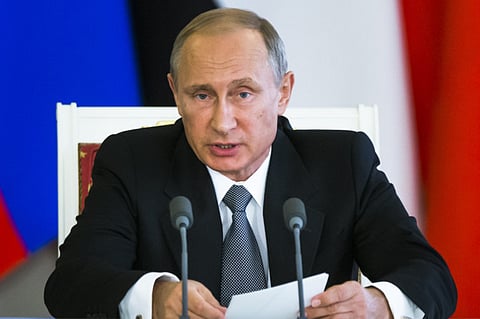Russia’s facade of flexibility on Syria
Wittingly or unwittingly, the Al Assad regime’s rejection of the Saudi peace plan jeopardises Moscow’s anti-terror alliance proposal

Following weeks of hectic diplomatic efforts to find a political solution to the Syrian crisis, things seem to be back to square one; wherein all parties to the conflict have reiterated their original positions. Russian Foreign Minister Sergei Lavrov dismissed reports that his government’s policy on the Syrian crisis has changed. “While some of our partners believe that it is necessary to agree in advance that at the end of the transitional period, the president [Bashar Al Assad] will leave his post, this position is unacceptable for Russia.” Saudi Arabia responded by rejecting a Russian invitation to join an international coalition against terrorism that would include the regime of Al Assad. Saudi Foreign Minister, Adel Al Jubair, went as far as to threaten military action against Al Assad if diplomatic efforts fail to remove him from power. As a result of this exchange, it has been reported that King Salman Bin Abdul Aziz has cancelled a state visit to Moscow and flew instead to Washington where he is to hold a summit meeting with United States President Barack Obama today.
This rising tension between Riyadh and Moscow over Syria is a clear departure from the positive atmosphere that prevailed earlier this year. Sensing a shift in the balance of power in favour of the armed Syrian opposition and fearing a sudden collapse of the regime, Russia sent several clear messages that it was willing to reach a compromise on the Syrian conflict. Russia’s overtures towards the Gulf states, Saudi Arabia in particular, began at the start of this year, as western sanctions — imposed on Moscow, following its annexation of Crimea — started to show their impact on Russian economy. The dramatic drop in oil prices, brought about by Saudi Arabia’s opposition to cut production, has also taken its toll on Russia’s foreign reserves.
The first Russian goodwill gestures came when Moscow unexpectedly chose not to block United Nations Security Council resolution 2216, which supported the Saudi-led military campaign against Al Houthi militias in Yemen last April. Saudi Arabia sensed a shift in Russian policy and decided to seize the opportunity. Saudi Defence Minister Prince Mohammad Bin Salman was sent to meet Russian President Vladimir Putin in St Petersburg last June. He signed an agreement for the construction of 16 nuclear power plants in Saudi Arabia by Russia. Speaking after the meeting, Putin suggested a broad coalition to combat terrorism, which would include Saudi Arabia and the Syrian regime. Putin’s proposal was met by incredulity even by Syrian Foreign Minister Walid Al Mua’alem.
Yet, despite this initial scepticism, Russia succeeded in arranging for a meeting between Prince Mohammad and General Ali Mamlouk, Syria’s National Security Chief. The meeting took place in Jeddah in early July, wherein Saudi Arabia’s vision for a resolution to the Syrian crisis was presented. It entailed the withdrawal of all Iran-backed militias, including the Lebanese Hezbollah, from Syrian territory in exchange for an end to Saudi support for the armed Syrian opposition groups. Al Assad’s political future, as prince Mohammad reportedly stated, was contingent on a political process that would result in UN-supervised parliamentary and presidential elections in Syria. The meeting was seen as a first step in a joint Russian-Saudi efforts to solve the Syrian crisis.
The Syrian regime’s response was not very positive, however. In a public speech in late July, Al Assad harshly criticised Saudi Arabia and described the presence of Hezbollah and other Iran-backed militias in Syria as a legitimate action.
Wittingly or unwittingly, the Syrian regime’s rejection of the Saudi peace plan jeopardises Russia’s anti-terror alliance proposal. This led Moscow, a long-time diplomatic champion of the Syrian regime, to allow the passing of the US-sponsored UNSC Resolution 2235, which called for an independent commission for the investigation of the use of chemical weapons within Syrian territory. Such a move could ultimately lead to legal proceedings against Syrian officials, if proved to be complicit in the use of chemical weapons.
Moscow’s position in the UNSC encouraged further Russian-Saudi dialogue, with Riyadh dispatching Foreign Minister Adel Al Jubair to Moscow to explore next steps. Once in Moscow, however, Al Jubair realised the depth of disagreement with his Russian hosts. While Lavrov reaffirmed his country’s commitment to the survival of Al Assad at the helm of the Syrian regime, his Saudi guest insisted that Riyadh would never join an anti-terror coalition that would include Al Assad. It proved that Russia’s latest flexibility was no more than tactical manoeuvres intended to ensure that there could be no political resolution to the Syrian crisis without Moscow’s blessing and involvement. To realise this objective, Russia thought that it could play Saudi Arabia and Iran against each other and end up having the upper hand in the fierce conflict to control Syria or the largest part of it.
Dr Marwan Kabalan is a Syrian academic and writer.
Sign up for the Daily Briefing
Get the latest news and updates straight to your inbox



